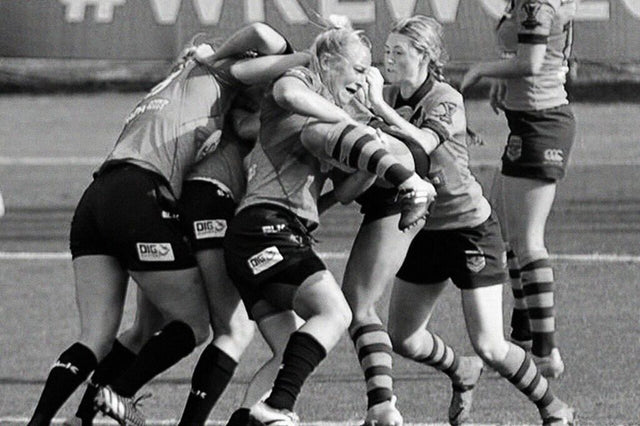Increasing capacity for skill mastery and collective learning in your team: Yes Coach, Yes Coach, Sure Coach, Got it Coach
Written By: Andrea Burk
When have you heard or said these words only to fall back into old habits? As a coach how many times do you give instruction before your athletes “get it” and change their habits?
The Canada Ravens started out in the same way this November at the Rugby League World Cup in Australia. Though given the tight timeline, adoption of the-new-to-them game of League needed to be accelerated. The outcome? A first ever World Cup win and a berth to the semifinals in their first World Cup appearance where many had all but written off the Ravens to make any sort of mark in the tournament.
So…
How can coaching staff increase the rate of skill mastery and team’s collective learning?
The Canada Raven’s squad was selected five weeks prior to the start of the tournament. With only one game to prepare for facing three time world champions – New Zealand’s Kiwi Ferns – the Ravens had their work cut out for them. They knew they had potential with Senior Women’s Team Internationals Mandy Marchak (captain), Andrea Burk, Gillian Boag, Natasha Smith, and Stevi Schnoor in the roster. Now it was a matter of maximizing their strengths and transferring rugby know-how to the rugby league code. To be successful, coaching staff needed to increase the rate of learning and understanding amongst their players.

Typically, coaches tend to tell their players what needs to happen; to which the common response is “Yes, Coach; Sure thing, Coach; Got it, Coach.” While the players might cognitively understand what needs to happen, the skill adoption lags, invariably leading to continual efforts to improve, and frustrations mounting within both parties. The Ravens, too, experienced this through their three trial matches with little change in behaviour despite constant tips from coaches to put more people into the tackle and hold down the opposition for longer periods of time.
This method falls into the Complicated Environment of the Cynefin Framework (as described in the earlier Ædelhard article Complexities of Coaching). Considering few scenarios are the same in a complex sport like rugby, enhancing a player’s ability to make sense of a situation will decrease the amount of time it takes for players to change their habits. Additionally, building a team’s capacity for collective sense-making in this way considers the vision from each position, and builds overall cohesion necessary for success.
HERE’S HOW THE RAVENS DID IT:
Players watched the game video and asked the team to make sense of what they saw, making two lists:
- What was happening when things went well?
- What was happening when things didn’t go well?
Players wrote each idea on separate cards and grouped ideas into like categories. Players then formed small groups to name each category.
 WHY DID THIS WORK?
WHY DID THIS WORK?
“Generally, with other teams I’ve been involved with, the coaching staff would point out the things that the team need to work on, and then head to the field to practice. This time the players themselves, guided by Andrea & our leadership team, took more ownership, and the environment was set up for players to spot these things themselves. I believe this lead to a deeper level of understanding. They were able to see not only what they need to do, but why it would help their performance,” explained Ravens head coach Mike Castle.
Mandy Marchak added her take as captain of the fledgling rugby league team: "As a very experienced player going through this, regardless the amount of time I had spent playing union, I felt like I was starting from the beginning. What helped me feel as comfortable and confident with the players and staff around me was that we were all figuring it out together. [We worked through] some specific analysis that helped us identify strengths and work-ons. We focused on building off our previous performances and not dwelling on what we could have done better, and I feel like that helped us stay focussed on what we were trying to achieve as a team, and how we were going to do that. It felt amazing."WHAT WAS THE RESULT?
Key themes Ravens identified, called Key Actions that will change the outcome of the game:
When the Ravens faced off against Papua New Guinea in their second game of the tournament, here’s how the game changed:
THE BOTTOM LINE
These processes take more time on the front end, yet will save a lot of time in the long run. There is no magic bullet to getting it right when working with teams. Every group will have its own personality much like individual people; this is the way of a complex environment. The trick is to increase collective sense-making that enhances desired results, to be patient & be flexible.
Andrea Burk represented Canada in rugby 7s, 15s & League. She has competed for Canada in three World Cups, winning a silver medal in 2014, and was a part of the Rugby 7s Rio Olympic Broadcasting Team. Andrea was born in North Vancouver, BC, where she has played rugby since aged fifteen for her home club Capilano RFC and high school Carson Graham Eagles. Off the field, Andrea is passionate about creating high-performing teams & taking the ordinary to extraordinary.


 Stats 1st Pool Game vs NZ
Stats 1st Pool Game vs NZ
